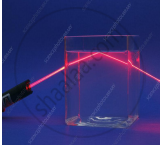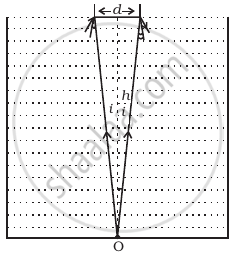Advertisements
Advertisements
Question
Answer the following question.
Define the critical angle of incidence and obtain an expression for it.
Solution
- The critical angle for a pair of refracting media can be defined as that angle of incidence in the denser medium for which the angle of refraction in the rarer medium is 90°.
- Let n be the relative refractive index of a denser medium with respect to the rarer.
- Then, according to Snell’s law,
n = `"n"_"denser"/"n"_"rarer"=(sin"r")/(sin"i"_"c")=(sin90°)/(sin"i"_"c")`
∴ sin (ic) = `1/"n"`
APPEARS IN
RELATED QUESTIONS
State the conditions required for total internal reflection of light to take place
State the relation between the critical angle and the absolute refractive index of a medium.
Draw the diagram of a right-angled isosceles prism which is used to make an invented image erect
What do you understand by the deviation produced by a prism? Why is it caused?
Name two factors which affect the critical angle for a given pair of media. State how do the factors affect it.
Define critical angle for a given medium.
Images formed by totally reflecting prisms are brighter than the image formed by ordinary reflected light, why?
Name the factors affecting the critical angle for the pair of media.
What is meant by the statement, ‘the critical angle for diamond is 24°’?
What is meant by the term ‘critical angle’?
Complete the following diagram to show the path of the ray of a single colour in the diagram as if enters in and emerges out of the prism. Mark the angles wherever necessary. (Critical angle for glass = 42°).

A ray of light is incident on a glass surface at an angle of 50° with the corresponding angle of refraction 30°. Find the value of the R.I. of glass.
Answer the following question.
Describe the construction and working of an optical fibre.
Answer the following question.
What are the advantages of optical fibre communication over electronic communication?
Solve Numerical example.
A monochromatic ray of light is incident at 37° on an equilateral prism of refractive index 3/2. Determine angle of emergence and angle of deviation. If angle of prism is adjustable, what should its value be for emergent rays to be just possible for the same angle of incidence?
Observe the given figure and write appropriate phenomenon of light in the box.

For the same angle of incidence, the angle of refraction in four media A, B, C and D are 25°, 30°, 35° and 40° respectively. The speed of light is least in medium ______.
Which one of the following is NOT the correct formula for refractive index of glass w.r.t. air (aμg) (i = angle of incidence, r = angle of refraction)
For a ray of light, the critical angle is minimum when it travels from ______.
The entire light is reflected back into the denser medium is called ______.
The critical angle is defined as the angle of incidence at which the total internal reflection starts to occur.
The angle of incidence at which the angle of refraction is Q£ is called the critical angle.
Write any two uses of total internal reflection.
A green light is incident from the water to the air-water interface at the critical angle (θ). Select the correct statement.
A jar of height h is filled with a transparent liquid of refractive index µ (Figure). At the centre of the jar on the bottom surface is a dot. Find the minimum diameter of a disc, such that when placed on the top surface symmetrically about the centre, the dot is invisible.

A light is entering from one medium refractive index `("RI" =5/3)` to another medium at an angle 30°. The angle of refraction for other medium is sin-1 `(5/6)`. then the increase in angle of incidence is ______ such that the ray of light reflected back into the same medium.
Which of the following is used in optical fibres?
Small air bubbles rising up a fish tank appear silvery when viewed from some particular angle is due to the ______.
